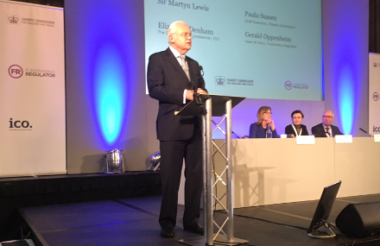The Commission on the Donor Experience has published 526 recommendations to improve the relationship between charities and donors, as its chair calls for a “profound change”.
The 18-month project found that the public’s experience of fundraising activity was inconsistent, and recommended a wide range of changes to improve the experience of donors. Full recommendations and other resources are available on the commission’s website.
Sir Martyn Lewis, chair of the commission, said: “Our research shows that profound change is needed and that charities need to give supporters genuine choices. It is time we stopped thinking about what not to do, and started thinking about what to do better, ensuring that donors feel really great about their giving.
“That is why the commission is making this call to action to charities and asking them to think seriously about the promise they can make to donors.”
A survey of 1,040 people found that while 90 per cent had experienced good practices, 87 per cent also had an experience of worst practice.
Offer donors more choice
A key recommendation is to offer donors more choice on how people contact them.
Research found that 54 per cent said that the charities they support enabled them to choose how to hear for them.
Focus group participants also said that the ability to tailor communications was missing, the commission said.
526 ideas for change
The full body of work includes 28 projects, 526 ideas for change and 250 case studies.
But the commission has summarised these into six points:
1. Purpose
Fundraising charities will only earn the public trust, confidence and respect they need if they place the interests, convenience and positive experiences of their supporters as their top priority.
2. Permanent change
This is not about short-term cosmetic solutions. Charities need a lasting culture change that goes deep into our people and our organisations, and which challenges conventional practices and attitudes.
3. Principles
Fundraisers must be judged by longer-term, more donor-friendly criteria, rather than just by income raised now. New criteria should include retention, satisfaction, non-financial engagement, future giving intentions, loyalty, commitment and lifetime value.
4. Pillars of change
The 12 pillars of change focus on integrity, skills, education and leadership, and are designed to ensure that values and creativity can be turned into achievable and practical action.
5. Promise to donors
By making a public commitment to donors, supporters will better understand and appreciate their role in bringing about change. So, the challenge to charities is “What new promise will you make to donors?”
6. Practical actions
From the use of language and emotion, to different tools and techniques, through to trustee boards, service culture and investment, this is a comprehensive resource covering many different aspects of fundraising, and which is available for all to use.
Responding to Michael Grade
In response to the opinion piece from Michael Grade in yesterday’s Telegraph, Lewis said that the public’s generosity “cannot be taken for granted” but stressed that the commission’s approach differed from that of the Fundraising Regulator.
Lewis added: “We have brought together new research, along with the insights and experiences of more than 1,000 people from across the voluntary sector, to set out the goals, principles and tools for charities to help them change their fundraising practice. The work conducted has been a huge undertaking and has seen the charity sector come together in force to demonstrate its commitment to donors.
“We agree that the members of the public should be offered a practical way to ask charities to stop sending unwanted fundraising communications. Our research has also highlighted the value of offering donors choice over how and when charities contact them.
“However, the commission’s approach and response to this is significantly different to that of the Fundraising Regulator.
“Whilst tackling the symptoms is important, the commission’s intention is to transform fundraising; to change the culture to a truly donor-based approach to raising money.
“So, while the FPS is tackling one of the symptoms, the Commission is addressing the underlying cause.
“Our recommendations, when fully implemented, should ensure donors are always treated with the respect they deserve and should make services such as the FPS redundant.”
Editor's note: One of our staff, David Ainsworth, was a contributor to the Commission on the Donor Experience.
Related articles











